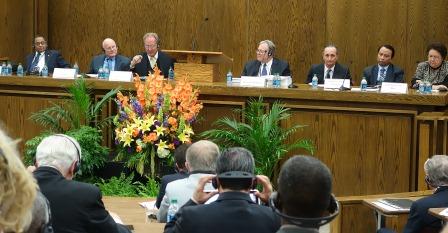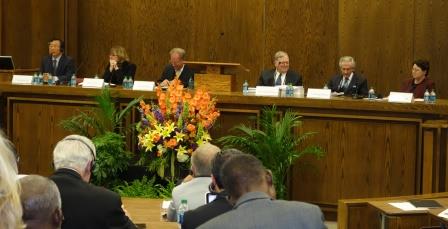Symposium 2014: Conference Summation and Concluding Reflections
Reported by Jedediah Knight
Moderator: David Kirkham
Participants Panel 1: Mariano Germán Mejia Jiménez, President, Supreme Court of Justice, Dominican Republic; Tore Lindholm, Norway; Guillermo García-Montúfar, Peru; Mohd Hasbi Abu Bakar, Singapore; Lyudmila Filipovich, Ukraine
Participants Panel 2: Byun-Sun Oh, South Korea; Sue Breeze, United Kingdom; J. Clifford Wallace, Senior Judge, Ninth Circuit Court of Appeals, United States; Elizabeth Clark, United States
Concluding Speaker: W. Cole Durham, Jr., President, International Center for Law and Religion Studies


During the final plenary session, several of the presenters were given the opportunity to share their reflections on the symposium.
Tore Lindholm summarized the concept of secularism, referring specifically to political secularism as a normative idea to be applied to states consisting of a plurality of religious communities. Functionally, political secularism should not identify with any particular lifestyle or religion, but rather should even-handedly respect, protect, and facilitate all lifestyles and religions. The secular state, then, is not an enemy of religion, but at the same time it does not identify with any religion, otherwise it could not be even-handed. In this way a there can be a secular society that is not at logger-heads with religion. A government is secular by respecting, protecting, and even providing financial support to religion when it is done even-handedly.
Mariano German Mejia Jiménez followed Professor Lindholm with a fiery defense of tolerance and secularism. Religion is an integral part of human belief that arises from the search for answers and explanations. However, it seems that once a person has these explanations, he has to permanently defend them, turning belief into the act of defending discovered truths. Rather, there should be respect between the varieties of beliefs. Having such understanding requires prudence, which in turn requires wisdom. It is concerning that there still exists such intolerance that people are willing to kill each other over their religious beliefs (e.g. Nigeria and Boko Haram). Dr. Mejia concluded by asking the audience two questions: (1) What do you believe, and (2) What do those that believe in nothing believe?
Lyudmila Filipovich offered sincere and plenteous gratitude to the Center, the Symposium staff, and the LDS Church for hosting such a “great school of tolerance.” Professor Filipovich reflected on the revolution that occurred in Ukraine during the winter of 2013-14 as a movement that expressed in practice the theories talked about in the Symposium. She presented the Center with a Ukrainian-language copy of the book Maidan and the Church, which documents the Ukrainian revolution. She further expressed how conferences like the Symposium have shaped public policy in Ukraine. Ukraine supports alliance, cooperation, and mutual understanding and assistance of believers and non-believers alike.
Guillermo Garcia-Montúfar commented on how the talk given by Alberto Patiño Reyes during the third plenary session provided a very accurate summary of the state of affairs regarding secularism in Latin America. First, while registration is not a formal requirement for religious organizations in most Latin American countries, the benefits bestowed on organizations that do register, such as administrative recognition before public entities, essentially makes registration a requirement. Second, despite the fact that secularity is becoming a reality in Latin America, some religions still receive special benefits from governments. If secularity is truly to be achieved, all religions should have the same benefits and recognition. Finally, Professor Garcia prayed all the attendees would travel home safely.
Mohd Hasbi Abu Bakar expressed gratitude for the opportunity to attend the Symposium, for the organizing committee, the staff, and the volunteers. He felt privileged to be invited, and felt that his understanding had been broadened. The information he gathered at the Symposium would be invaluable in enhancing his interfaith work in Singapore.
Byung-Sun Oh observed how seriously the participants treated the subject of the Symposium. It is important that the younger generation attends events like the Symposium and passes along to their peers what they have learned. Law and religion are two important pillars in maintaining society, keeping peaceful order, and providing guidance through life. Modern societies suffer from an illness. The diagnosis: not understanding sufficiently the differences between secularity and secularism discussed by Brett Scharffs. Religion faces a crisis of legitimacy, lack of public trust, and lack of authority. The prescription is finding a way to reach, and actually reaching, consensus. Korea does not suffer from this illness like other countries. The government is neutral and the church and state are separate. However, churches enjoy some authority, and the government even participates in religious ceremonies. Religion is welcome in Korea because society needs harmony and reconciliation.
Susan Breeze opened her remarks by offering her gratitude to the help and organizers. She was very touched by the surroundings and the great pride in the school. There was a tremendous variety of presentations, and the translation was impressive. Secularism is an unstoppable juggernaut. Understanding secularism, including ways to respond to it, is helpful to government. There is a need to remain hopeful.
J. Clifford Wallace expressed his appreciation of the Symposium, the value, and the high degree of interest in it. The title of the Symposium, Varieties of Secularism, Religion, and the Law, includes an Oxford comma that is significant in the meaning of the title. Senator Hatch opened the Symposium with a discussion on the development of the law through legislation. Most countries draft a document at inception that represents a compact between the people. This document is fundamental to a judge. Judges should apply the constitution. The US Constitution was not a rights constitution, but rather a document protecting the people from the government. During the writing of the Constitution there was some debate about whether to include rights, and that debate resulted in the Bill of Rights that amended the original constitution. The first rights enumerated were in the First Amendment. It was hard for the drafters to know variety would be seen, and it has since been observed that it includes secularism. The Constitution does not say anything about a right to religion or secularism. The First Amendment prevents the government from establishing a religion and prevents the government from interfering with the free exercise of religion. The Constitution did not originally give rights for the same reasons that a market economy works; as long as there is no monopoly, free enterprise is best. All churches were free to proselytize, and Congress couldn’t interfere with the rules of play. Note that the wording of the First Amendment does not include any “high wall of separation.” Those words came from Thomas Jefferson years after the document was written. It is clear that the Founders believed the government could offer a helping hand to religion as long as no preference was shown. Judge Wallace closed by expressing gratitude to the organizers and staff, and by posing the question: What do we do with the new wave of secularism?
Elizabeth Clark expressed gratitude to the panel speakers and attendees. The Symposium is a wonderful opportunity to think about questions at an airplane level and to view the nuanced, careful pictures of each country. Doing so adds to the rich picture of secularism. The Symposium is a wonderful opportunity to think together about the role of religion in public life. In the spirit of inclusiveness, the New Testament compares believers to a body, where each member plays an important role. Thus, the eye cannot say to the hand, “I have no need of thee,” nor the head to the feed, “I have no need of you.” This is true at the Symposium, and it is true regarding religion and the state. Religious believers need the state and the rule of law. Similarly, religion contributes to a flourishing society, commitment to the rule of law, and obedience to the unenforceable. Further, the same is true across all levels of society. All members of society contribute to building a community where all members are valued.
W. Cole Durham extolled the importance of comparative law to law reform. Using comparative law in law reform is like performing heart surgery. There might be an adverse reaction, or rejection, and other things that make it complicated. A considerable problem facing law reform with regard to religion is that it is not often viewed in terms of looking at issues across the world. Another issue is the duty of translation problem. In translating between the “languages” of religion and “secularese,” there is the question of who bears the burden of translating what is being said so that the other side can understand. A Hungarian judge once commented that the party that claims to have special knowledge, or a richer store of knowledge, should bear the burden of translating. It is important to note, as well, that when translation is needed, it is best to have a native speaker learn the foreign language and do the translating so that the ideas are conveyed most accurately. Yet another problem facing the discourse on religion and secularism is conceptual smuggling. Parties on both sides are worried about their ideas being smuggled to the other side. Again, thinking about translation, the process has to be cooperative; it cannot be unilateral. Furthermore, in translation, it is always useful to look at examples of how others have solved similar problems. The duty of translation is incumbent upon everyone, and hopefully the Symposium has contributed to that in some small way.